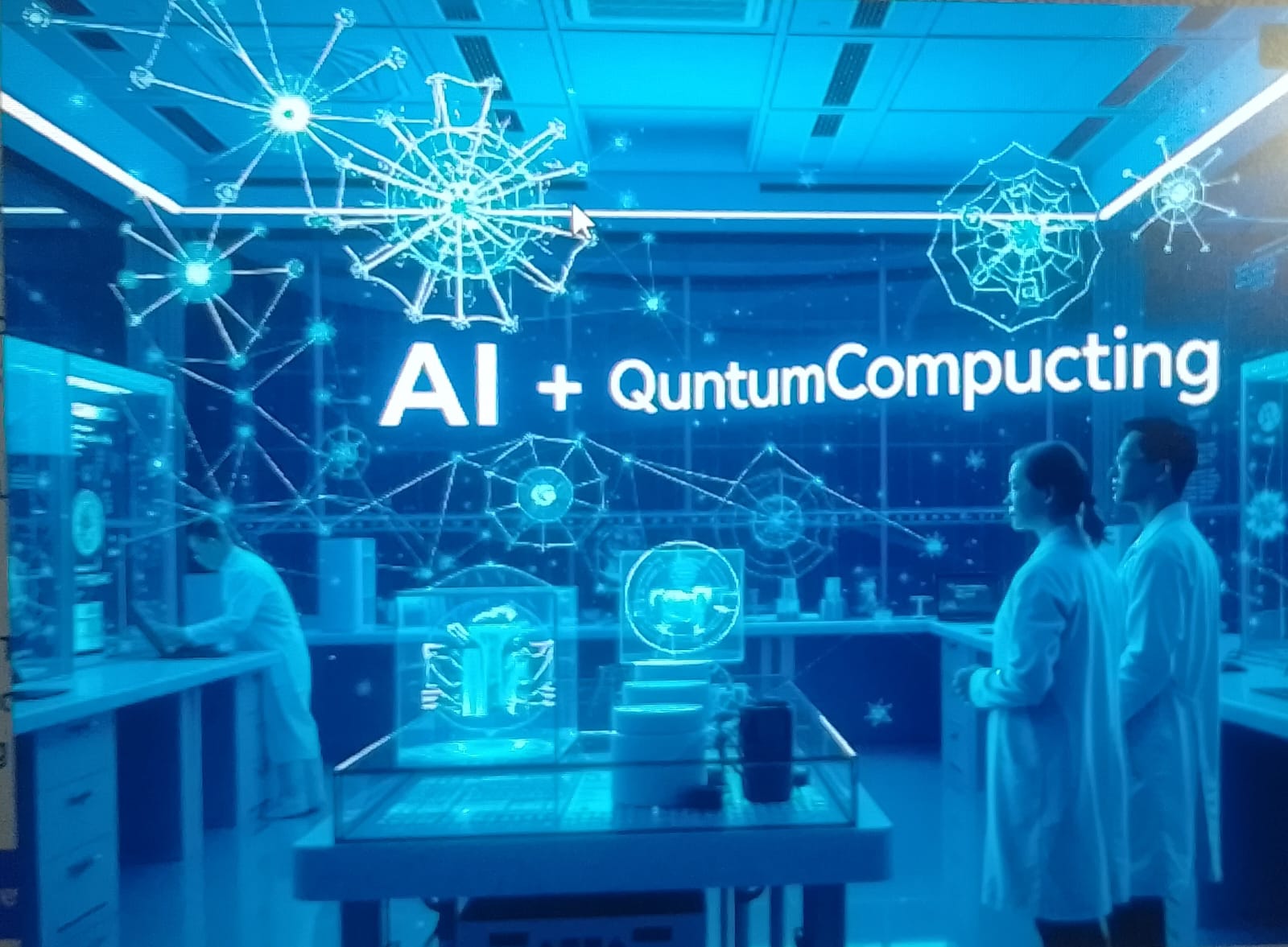
Introduction
🚀 Brace yourself for a thoughts-bending adventure into the future! Have you ever questioned how synthetic intelligence appears to be advancing at lightning speed, transforming complete industries in a single day? The secret lies in a groundbreaking fusion of AI and quantum computing – a technological powerhouse that is reshaping our international faster than we will blink.
Imagine a world in which complex troubles that took years to solve at the moment are unraveled in seconds. Where economic fashions predict market developments with uncanny accuracy, and drug discovery happens at a pace we in no way notion feasible. This isn’t technology fiction; it’s happening properly now, thanks to the wedding of AI and quantum computing. But right here’s the kicker: most humans have no concept of how this powerful combination works or simply how notably it is converting the sport across each area. 🤯
Are you prepared to discover the surprising truth behind this technological revolution? Join us as we dive deep into the quantum realm, exploring how AI harnesses the thoughts-boggling electricity of quantum computing to revolutionize industries.
We’ll resolve the mysteries of quantum advantage, show off actual global achievement testimonies, or even tackle the ethical dilemmas this incredible era offers. Buckle up – it is time to quantum soar into the future of AI!

Understanding AI and Quantum Computing
Defining AI and its Current Capabilities
Artificial Intelligence (AI) refers to laptop systems designed to carry out tasks that commonly require human intelligence. These responsibilities consist of:
- Visual perception
- Speech reputation
- Decision-making
- Language Translation
AI has made sizable strides in recent years, with packages ranging from virtual assistants to self-reliant motors. Current AI competencies consist of:
- Machine Learning: Ability to analyze facts without specific programming
- Natural Language Processing: Understanding and Producing Human Language
- Computer Vision: Interpreting and studying visual records
- Predictive Analytics: Making predictions based on historical information
Explaining Quantum Computing Basics
Quantum computing harnesses the principles of quantum mechanics to method records. Unlike classical computer systems that use bits (0s and 1s), quantum computer systems use qubits, which can exist in multiple states concurrently.
Key concepts in quantum computing include:
| Concept | Description |
|---|---|
| Superposition | Qubits can be in multiple states at once |
| Entanglement | Qubits can be interconnected, even at a distance |
| Quantum Gates | Operations that manipulate qubits |
The Synergy Between AI and Quantum Computing
The mixture of AI and quantum computing creates a powerful synergy that could revolutionize numerous industries. Quantum AI leverages the particular houses of quantum systems to decorate AI algorithms, mainly to:
- Faster processing of complex datasets
- More green device-mastering models
- Solving formerly intractable problems
This synergy permits AI to tackle challenges that had been once taken into consideration as impossible, paving the way for groundbreaking advancements throughout more than one sector.
The Quantum Advantage in AI
Now that we recognize the basics of AI and quantum computing, permit’s explore how quantum computing offers AI an extensive side over classical computing methods.
Superposition and parallel processing
Quantum computers leverage the precept of superposition, allowing qubits to exist in multiple states simultaneously. This allows big parallel processing skills, dramatically accelerating AI computations. For instance:
- Traditional AI: Processes one state of affairs at a time
- Quantum AI: Evaluates multiple situations concurrently
| Feature | Classical AI | Quantum AI |
|---|---|---|
| Processing | Sequential | Parallel |
| Speed | Limited | Exponentially faster |
| Complexity | Struggles with large datasets | Excels with complex problems |
Quantum entanglement for greater facts evaluation
Quantum entanglement allows qubits to be interconnected, irrespective of bodily distance. These belongings enhance AI’s ability to research complicated relationships inside sizable datasets, mainly to:
- More accurate pattern reputation
- Improved predictive modeling
- Enhanced natural language processing
Quantum algorithms for gadget learning
Quantum algorithms specially designed for gadget-studying tasks offer substantial blessings:
- Quantum Support Vector Machines: Faster class of information
- Quantum Principal Component Analysis: More green dimensionality reduction
- Quantum Neural Networks: Exponentially larger parameter space for deep gaining knowledge of
Overcoming classical computing limitations
Quantum AI transcends the limitations of classical computing, permitting:
- Solving formerly intractable troubles
- Handling exponentially large datasets
- Discovering new optimization strategies
With those quantum benefits, AI is poised to revolutionize industries overnight. Next, we’re going to discover the particular sectors experiencing transformative changes due to AI-powered quantum computing.
Industries Transformed by AI-Powered Quantum Computing
A. Healthcare and Drug Discovery
AI-powered quantum computing is revolutionizing healthcare, mainly in drug discovery. Quantum algorithms can simulate complicated molecular interactions, considerably accelerating the identity of potential drug applicants. This quantum advantage has decreased the time and fee of growing new treatments for diseases like most cancers and Alzheimer’s.
| Traditional Drug Discovery | AI-Powered Quantum Drug Discovery |
|---|---|
| Years of research | Months of computational analysis |
| Billions in R&D costs | Fraction of traditional costs |
| Limited molecular modeling | Comprehensive molecular simulation |
B. Financial Services and Risk Assessment
In the financial sector, quantum AI is transforming threat assessment and portfolio optimization. Quantum algorithms can analyze big datasets and complex marketplace scenarios in actual time, enabling more accurate predictions and better choice-making.
C. Cybersecurity and Encryption
Quantum computing poses a threat and an opportunity for cybersecurity. While it can wreck current encryption methods, it also permits the development of quantum-resistant cryptography, ensuring statistics safety in post-quantum technology.
D. Logistics and Supply Chain Optimization
AI-powered quantum computing is optimizing logistics and supply chains by way of:
- Solving complicated routing issues
- Predicting demand with unparalleled accuracy
- Optimizing inventory control
- Enhancing actual-time decision-making in global delivery networks
E. Climate Modeling and Environmental Protection
Quantum AI is revolutionizing weather modeling, enabling extra correct predictions of climate change effects. This technology is crucial for developing powerful techniques to combat international warming and defend our surroundings.
With these transformative packages throughout industries, AI-powered quantum computing isn’t just reshaping character sectors but is basically altering the worldwide financial landscape. As we explore these revolutionary changes, it’s critical to take a look at real-world applications and success tales that display the realistic impact of this era.
Real-World Applications and Success Stories

Breakthrough discoveries in substance science
Quantum AI has revolutionized substances technology, allowing researchers to discover and design new materials with exceptional velocity and accuracy. By leveraging quantum computing’s ability to simulate complicated molecular structures, AI algorithms can expect the homes of novel materials earlier than they’re synthesized within the lab.
Table: Quantum AI vs. Traditional Methods in Materials Science
| Aspect | Quantum AI | Traditional Methods |
|---|---|---|
| Speed | Hours to days | Months to years |
| Accuracy | Highly precise | Limited by classical approximations |
| Complexity | Can handle multi-atom systems | Struggles with complex structures |
| Cost | Reduced experimental costs | High experimental costs |
Optimizing visitors drift in clever towns
AI-powered quantum computing has transformed city-making plans and traffic control. By processing great amounts of real-time statistics from sensors, cameras, and connected automobiles, quantum algorithms can optimize visitor flow, lessen congestion, and improve air satisfaction in smart towns.
- Adaptive site visitors’ light systems that respond to actual-time conditions
- Dynamic routing for emergency cars
- Predictive protection of transportation infrastructure
Revolutionizing weather forecasting accuracy
The aggregate of AI and quantum computing has notably greater weather forecasting capabilities. Quantum algorithms can process and analyze complex atmospheric data at an unparalleled scale, leading to extra correct and well-timed predictions.
Now that we have explored these groundbreaking packages, it is essential to consider the demanding situations and ethical implications that arise from this powerful generation.
Challenges and Ethical Considerations
As we delve deeper into the AI-quantum computing revolution, it is important to deal with the challenges and ethical issues that include this groundbreaking technology.
A. Technical hurdles in quantum computing
Quantum computing faces numerous technical challenges that should be overcome:
- Qubit balance and blunders correction
- Scaling up quantum structures
- Developing quantum-specific algorithms
| Challenge | Description | Potential Solution |
|---|---|---|
| Qubit stability | Quantum states are fragile and prone to decoherence | Advanced error correction techniques |
| Scalability | Difficulty in maintaining quantum coherence in large systems | Modular quantum architectures |
| Algorithm development | Classical algorithms don’t translate directly to quantum systems | Quantum-inspired algorithms and hybrid approaches |
B. Data privateness and protection issues
The significant energy of quantum AI increases well-sized privacy and safety troubles:
- Quantum computer systems ought to potentially spoil present-day encryption methods
- Handling touchy information in quantum systems requires new protection protocols
- Balancing statistics accessibility for AI education with privateness protection
C. Workforce displacement and retraining desires
The quantum AI revolution will probably disrupt job markets:
- Automation of responsibilities formerly requiring human know-how
- Need for staff retraining in quantum-associated fields
- Creation of new process roles in quantum AI improvement and protection
D. Ensuring accountable AI development
As quantum AI will become more effective, moral concerns emerge as paramount:
- Establishing pointers for fair and impartial quantum AI systems
- Ensuring transparency in choice-making procedures
- Addressing capability misuse of quantum AI technology
These demanding situations underscore the want for cautious planning and collaborative efforts as we pass ahead with quantum AI integration across industries.
The Future of AI and Quantum Computing

As we delve into the destiny of AI and quantum computing, we’re going to discover the thrilling traits at the horizon and their ability to reshape our global.
Predicted advancements in quantum hardware
The next decade guarantees substantial leaps in quantum hardware skills:
- Increased qubit rely and stability
- Improved blunder correction techniques
- Development of room-temperature quantum processors
| Timeframe | Predicted Qubit Count | Potential Applications |
|---|---|---|
| 2025 | 1,000+ | Complex simulations |
| 2030 | 10,000+ | Drug discovery |
| 2035 | 100,000+ | Climate modeling |
Emerging quantum-AI hybrid systems
The convergence of quantum computing and AI will cause powerful hybrid structures:
- Quantum-stronger neural networks
- AI-optimized quantum algorithms
- Quantum-inspired classical algorithms for AI
These hybrid structures will leverage the strengths of both quantum and classical computing, allowing exceptional hassle-solving talents.
Potential societal impacts and paradigm shifts
The integration of AI and quantum computing will catalyze transformative adjustments across diverse sectors:
- Healthcare: Personalized remedy and multiplied drug discovery
- Finance: Ultra-stable transactions and superior threat modeling
- Climate technological know-how: High-precision weather forecasting and climate change mitigation strategies
- Transportation: Optimized logistics and self-sufficient care coordination
As these technologies mature, we can anticipate a paradigm shift in how we technique complex issues, mainly to breakthroughs that have been as soon as an idea is not possible. The quantum AI revolution will push the limits of what’s practicable, reshaping industries and society at a massive.
Conclusion
The convergence of AI and quantum computing is ushering in a brand new generation of technological development, revolutionizing industries at a remarkable tempo. From healthcare and finance to logistics and cybersecurity, this powerful combination is solving complex issues that had been as soon as notion not possible. As we’ve explored, the quantum benefit of AI is permitting faster processing, greater correct predictions, and deeper insights throughout diverse sectors.
However, with awesome power comes high-quality obligation. As we embody the capacity of AI-powered quantum computing, we must also address the challenges and ethical considerations that arise. Stakeholders in each of the public and private sectors need to collaborate on developing frameworks that ensure the accountable and equitable use of those transformative technologies. By doing so, we will harness the whole capability of AI and quantum computing to create a destiny that will benefit all of humanity.


2 thoughts on ““How AI and Quantum Computing Are Revolutionizing Industries: A Deep Dive into the Future”